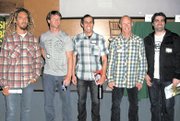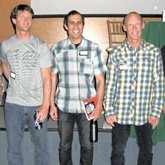Eco on the Agenda
The action-sports industry talks eco at SIMA’s “Green Boot Camp.”
The surf industry may be a competitive lot when it comes to its team rider rankings, retail sales numbers and product innovations. But when it comes to protecting the ocean playground through environmental sustainability, core brands are game to open their doors and exchange company strategies.
On April 13, ambassadors from The North Face, the Surfrider Foundation, Hurley, Ocean Minded, Quiksilver, Sole Technology and Volcom discussed their respective environmental initiatives at the Surf Industry Manufacturers Association’s “Green Boot Camp” at the Ocean Institute in Dana Point, Calif.
SIMA President Doug Palladini said the goal of the boot camp was to “break through that noise” of environmental buzzwords and focus on “what really matters in sustainability.” Coast Law Group Managing Partner Marco Gonzalez, who works with the Save the Waves Coalition and Surfrider Foundation, spoke about the importance of legislation that protects the environment. Avoiding ’greenwashing’
Adam Mott, corporate sustainability manager for The North Face, started off the day by defining “greenwashing,” the term used to describe misleading marketing messages about a company’s environmental practices or the benefits of its products or services. One example of greenwashing was an advertisement for water bottles that contained 15 percent less plastic. “It’s still a [disposable plastic] water bottle, which is a bad product,” Mott said.
Mott outlined The North Face’s sustainability plans, where accounting for every step is vital to being honest with the consumer. Mott examined water and energy use, waste and energy use, and greenhouse-gas emissions throughout the product lifecycle and looked at where usage can be reduced and alternative energy implemented. The North Face’s retail store in Idaho and Canadian headquarters are LEED-certified, and its overseas factories are Bluesign-certified.
Consumers are increasingly considering a brand’s fair-labor and environmental practices in their buying decisions, according to Matt McClain, director of marketing and communications for the Surfrider Foundation. McClain offered advice on how to choose which nonprofits to partner with and gave examples of successful campaigns and partnerships.
The most important element of a successful partnership is to make sure the event engages participants further than the “slactivist” level of simply donating money or signing a petition. “Make it experiential. Get people indoctrinated into the cause,” McClain said. He summed up that an ideal partnership integrates the brand’s identity into the outreach project. Teach by example
The surf industry’s sustainability efforts range from company-wide corporate initiatives to grass-roots activities that get employees involved.
Quiksilver’s efforts include using recycled polyester in 165,000 women’s Roxy, men’s Quiksilver and kids’ snow products. The total impact was the equivalent of 3 million recycled plastic bottles, according to company representative Jeff Wilson.
Volcom’s V.Co-logical series of products uses 100 percent certified organic cotton, hemp and vegetable dyes, organic stains, and other low-impact production methods, according to Derek Sabori, Volcom’s manager of the environmental-affairs division. Sabori recommended companies appoint a dedicated employee to oversee sustainability initiatives and to support employees’ own eco efforts.
Mike Gass of Ocean Minded highlighted the company’s beach cleanup series, which focused on a different set of volunteers each time. Among the 47 beach cleanups, volunteers included kids, the brand’s office employees, retail stockist employees, media from Surfline and employees from Zappos.
Pro surfer Rob Machado was also on hand to talk about Hurley’s water initiative, which included a partnership with Waves for Water and The Ecology Center. Machado spearheaded the digging of a well in Indonesia, which brought water to 500 people across three villages.
As a leading company in sustainable practices, Sole Technology’s Roian Atwood gave a lesson on lifecycle analysis. He showed carbon-footprint data on the planned construction of a new skate section in the Etnies skatepark and ways that Sole Technology is investigating making its construction more green or carbon neutral.























